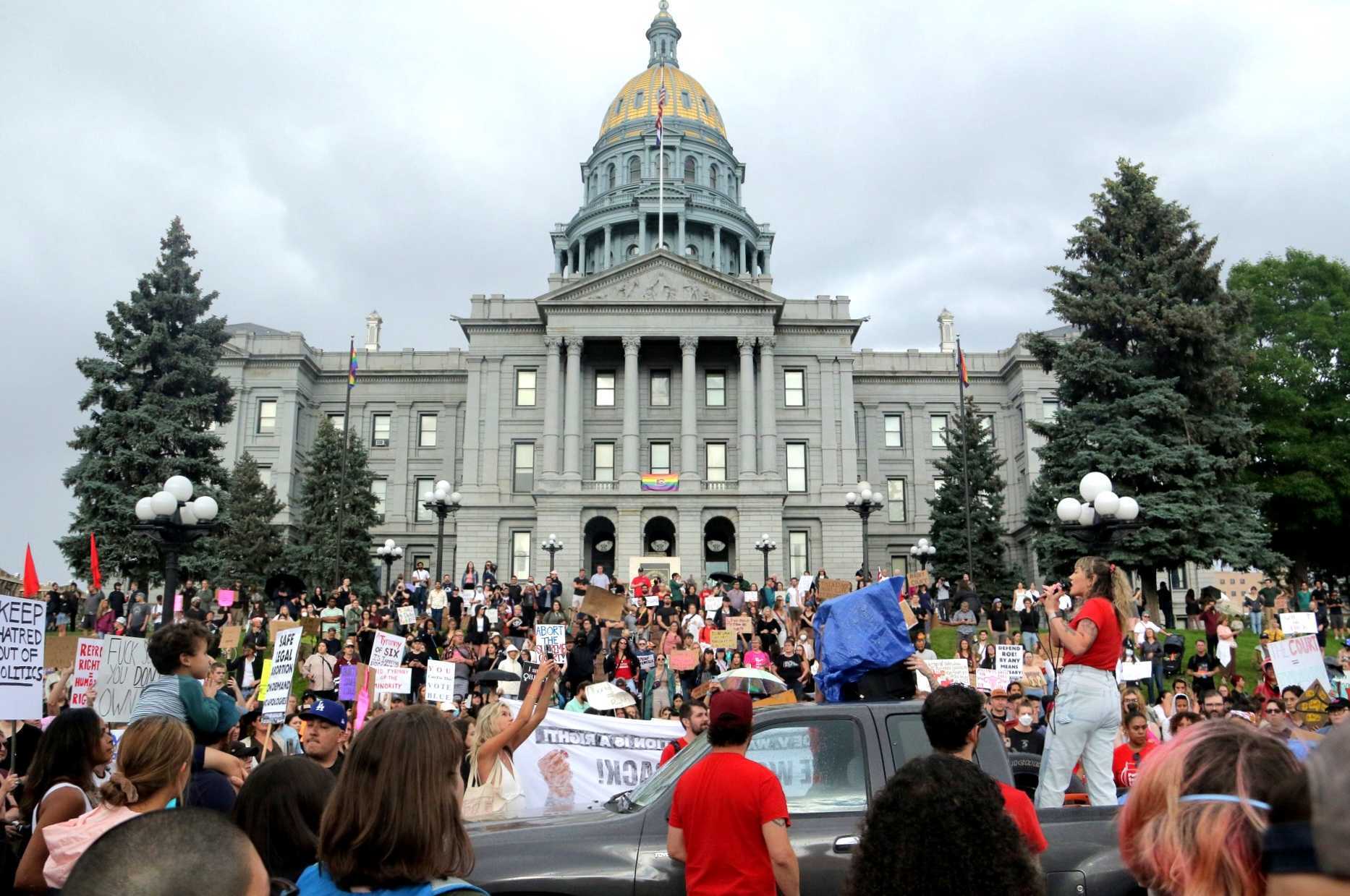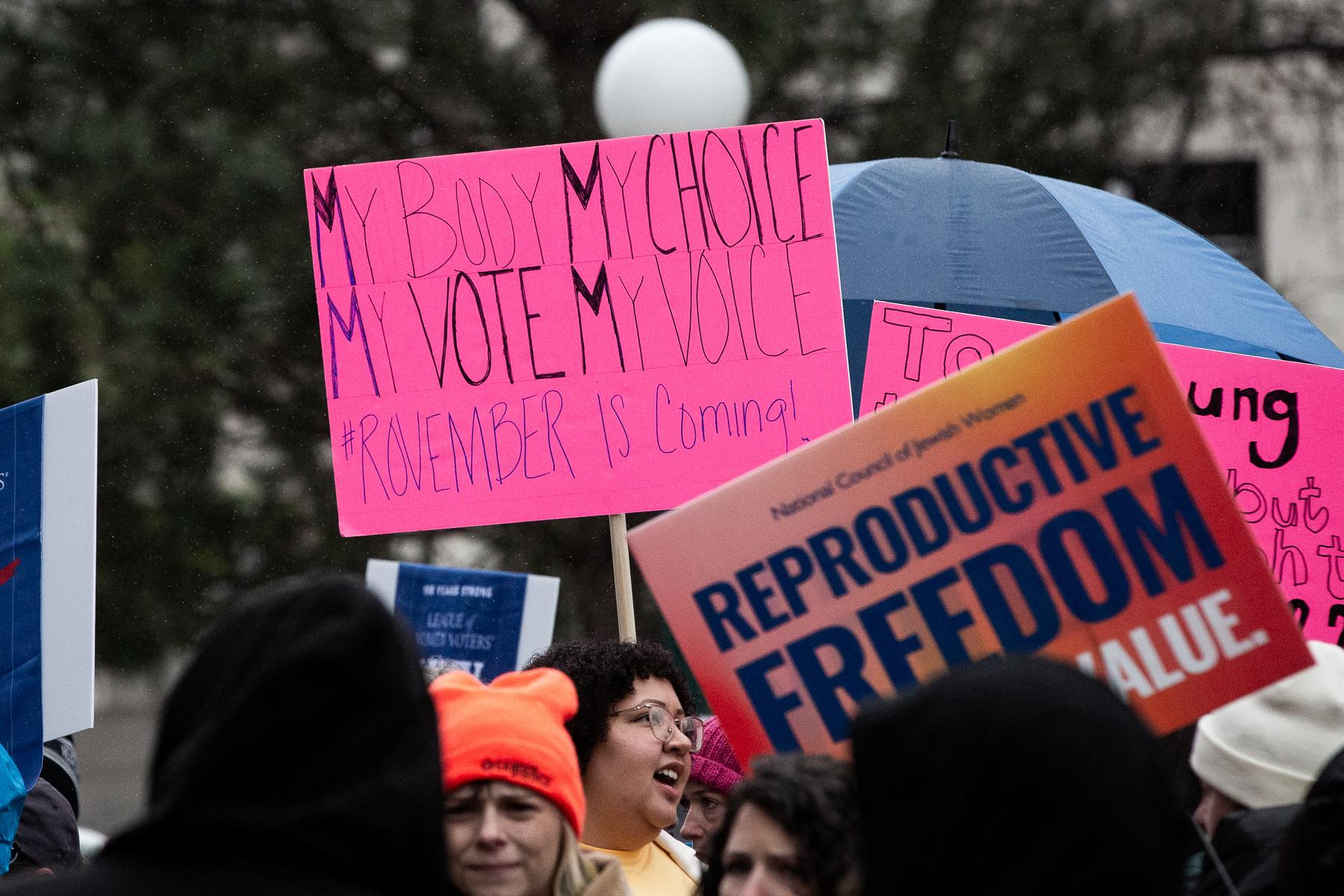
also by Will Cornelius, CPR Campaign Finance Intern
The U.S. Supreme Court decision holding there is no constitutional right to abortion leaves the procedure’s legal future in the hands of lawmakers at the state and federal level. And that is likely to put the issue front and center in some of Colorado’s biggest elections this year.
Colorado law affirmatively protects legal abortion, but without a change to the state constitution, that policy could be overturned by a future legislature and governor.
On Friday, Democratic Gov. Jared Polis, who is running for his second term, emphasized his support of the state’s recently passed law cementing legal abortion.
“Because of my administration and Democratic leadership in the legislature, Coloradans don’t have to worry because our rights are still protected today despite the unfortunate reality that the U.S. Supreme just rolled those freedoms back for millions of Americans in other states,” Polis said in a statement. “In Colorado, we will continue to choose freedom and we stand against government control over our bodies.”
The two Republicans running to oppose him in the general election had a very different response to the ruling.
Greg Lopez took to Twitter to call for a reset of the nation’s “moral compass.”
In an interview with CPR, Lopez said he opposes all forms of abortion, without exception for rape or incest, but he said he doesn’t support a federal ban on the procedure and believes states have the constitutional authority to decide on the issue.
The other GOP candidate in the race, Heidi Ganahl, also took to Twitter to respond to the ruling, calling it “the right decision.”
Ganahl told CPR’s Colorado Matters she opposes abortion in all circumstances except rape, incest and the health of the mother or fetus.” She opposes the new state law cementing the right to abortion care in Colorado.
The U.S. Senate candidates
The two Republican candidates for U.S. Senate both call themselves “pro-life” but their stances are comparatively far apart on what they want to see in law, and those divisions were already a consideration for many voters in their primary contest.
“I don’t support a total ban early on in a pregnancy,” said Joe O’Dea in response to the Supreme Court’s decision. “I know social issues are important to many Americans, but my focus is stopping the policies from Joe Biden that have forced inflation, $5 gas, and a record debt on the American people.”
At the recent Western Conservative Summit, hosted by Colorado Christian University in Aurora, he said he does support significant restrictions on the procedure, though.
“I support an end to elective late-term abortion, nationally, an end to taxpayer funding for abortion, nationally, a parental notice requirement, nationally,” he said.
Existing law already prevents federal funding for abortion in most instances.
O’Dea’s GOP opponent, state Sen. Ron Hanks, has said he opposes abortion at any point in pregnancy, with no exceptions.
“Life begins at conception,” he told CPR’s Colorado Matters. Abortion is “a horrible form of birth control, wouldn't you say? We ought to be not using abortion as a method of convenience when there's so many other options. Because once you've got something with a heartbeat, that's a grim moral tragedy that we're imposing on an innocent being.”
The man they both hope to run against, Democratic Sen. Michael Bennet, was quick to condemn Friday’s ruling.
“Today, a radical majority of the Supreme Court demolished fifty years of legal precedent,” he said in a statement. “This activist ruling strips women of their individual liberty to make intensely personal decisions about their bodies and futures, and eviscerates their Constitutionally protected rights to freedom and equality.”
Bennet called for voters to elect members of Congress and their state legislatures who will pass laws to keep abortion legal.
Congressional District 8
In the race for congressional district eight — the new seat created by last year’s redistricting process, candidates shared their views on the ruling on Twitter. The district is the state’s most politically competitive and expected to be a hard-fought battle in the fall.
“Today is a devastating day for America,” said state Rep. Yadira Caraveo, a pediatrician and the only Democrat in the race. “With the fall of Roe and Republicans committed to banning abortion across our country, millions of American women have lost access to their freedom to choose and to essential health care.”
On the other side, the four Republican candidates all celebrated the ruling.
Thornton mayor Jan Kulman wrote, “I’m pro-life — this issue is personal for me, and I applaud the Supreme Court’s decision today. This belongs to the states now, just as it always should have.”
State Sen. Barbara Kirkmeyer called it an “Exciting day for those of us who have toiled for the pro-life cause for so long!” She went on to write, “History will not look kindly on the last 50 years, but today we as a country are righting that wrong.”
“As strong Christians, today is a day my wife and I have been praying to witness,” Tyler Allcorn posted on Twitter. “The overturning of Roe v. Wade is a great victory for the sanctity of life and the unborn.”
In a Tweet of her own, Weld County Commissioner Lori Saine wrote, “Roe V. Wade is no more, Praise God! Thank u to SCOTUS & to Pres Trump for this victory! Pray for those in the pro-life movement whose lives are being threatened by Socialists who want to kill babies until birth. Pray for peace in this historic time & that hearts will be softened.”
Congressional District 7
The race for this district is more competitive than expected. It leans Democratic, but with long-time Rep. Ed Perlmutter retiring, Republicans hope a red wave could lift them to victory in this suddenly-open seat.
In response to the ruling, GOP candidate Laurel Imer posted a picture on Facebook of two newborn babies hugging. It read: “Thank You Justices” and then listed the names of the conservative justices who backed the majority opinion.
Imer wrote that the decision shows the constitution working as it was designed and said it will end “heinous and murderous practices around the country.”
“The matter of abortion will no longer be decided by unelected judges. Americans will be empowered to engage in civic discourse with elected officials at the state level which would empower outcomes that reflect the will of the people,” she continued.
Another GOP candidate, Erik Aadland, said he agreed with the Supreme Court’s decision to overturn Roe v. Wade and applauded the Justices’ courage.
“As a father of three children, I am distinctly pro-Life. As a Congressman, I will take a stand against any federal funding of abortion, upholding the Hyde Amendment,” he said. “Abortion should be a states’ rights issue, and even though I strongly disagree with the permissiveness of the recent Colorado law (HB 1279), which puts us on par with the laws of North Korea and China, I also respect the legislative process for the people of Colorado to decide how this sensitive issue is managed within the state."
The campaign for Tim Reichert said it would release a statement on the ruling. CPR will update this story when it is available.
In contrast to her Republican opponents, Democratic state Sen. Brittany Pettersen called it a “terrible day for civil rights in America.” She signed on as a cosponsor of the HB-1279
Pettersen added that this is an egregious decision and the biggest setback for reproductive rights “in our lifetime.”
“Millions of Americans' right to decide their own future and autonomy is being handed to politicians,” she said. “Make no mistake, if Republicans retake majorities in Congress they will not hesitate to pass a nationwide abortion ban. I have fought to protect reproductive rights here in Colorado, and I will fight for Colorado values in Congress to ensure women have autonomy over their own reproductive health decisions.”









